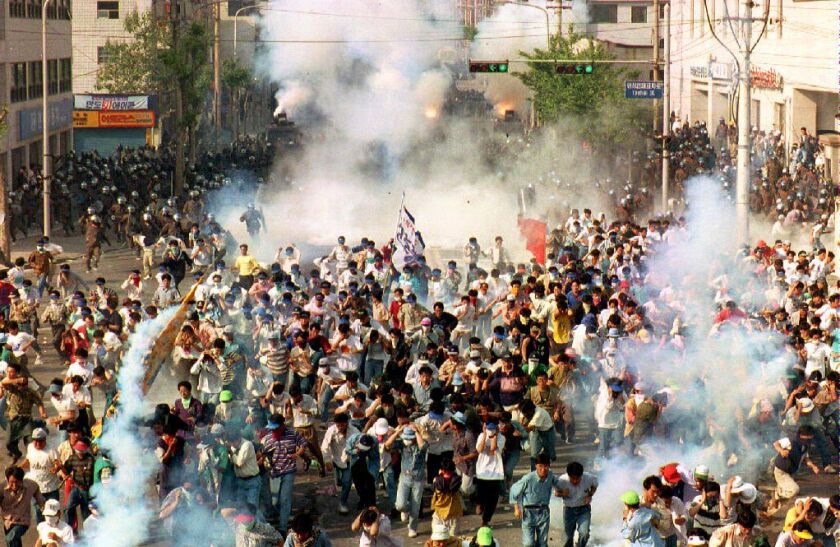Chun Doo-hwan, ex-military dictator in South Korea, dies
Chun Doo-hwan, a one-time authoritarian ruler of South Korea who got here to energy in a navy coup and oversaw a brutal crackdown of democratic protestors throughout his reign within the Eighties, died Tuesday. He was 90.
The previous dictator’s legacy is formed as a lot by the ruthlessness of his actions as by his unapologetic denials and lack of any expressions of remorse lengthy after the nation grew to become a thriving democracy. Within the mid-Nineteen Nineties, he was prosecuted and sentenced to loss of life for his energy seize and bloody navy repression. Chun was later pardoned.
Chun, who was recognized earlier this yr with a number of myeloma, collapsed in his Seoul dwelling early Tuesday, based on his former spokesman. On the time of his loss of life, he nonetheless owed greater than $80 million in restitution that prosecutors have mentioned had been the ill-gotten proceeds of corruption. He refused to pay, claiming at one level that he had simply 291,000 received — lower than $250 — to his identify, however prosecutors have continued to pursue and discover belongings, together with some hidden away within the U.S.
Chun stays for a lot of South Koreans a defiant emblem of a painful chapter of South Korea’s trendy historical past. He was a part of a navy junta that seized management of the nation in 1961 beneath military basic Park Chung-hee, and served in key roles throughout Park’s two-decade dictatorship over the nation till his assassination in 1979. After Park’s loss of life, Chun took management of the navy, declared martial legislation and assumed the presidency.
The years beneath Park and Chun had been additionally a time of meteoric financial progress and industrialization for South Korea, the nation’s business thriving and its exports rising. On the identical time, beneath their authoritarian rule, dissidents and pupil activists calling for democratic reforms had been kidnapped, tortured or disappeared.
His most enduring notoriety is for the navy’s violent suppression of a civilian rebellion within the metropolis of Gwangju in Might 1980. Troops beneath his command opened fireplace on lots of protesting residents, a lot of whom had been college students, killing tons of. The U.S.’s lack of intervention and tacit approval of Chun’s rule set off a wave of anti-American sentiment and protests, which continues to reverberate to at the present time.
“His rule was marked extra by illegality and violence than another president,” mentioned Choi Jin, who runs Seoul-based Institute of Presidential Management and reported on the civilian deaths in Gwangju as a journalist within the late Eighties. “To his final days, there wasn’t a private apology, a lot much less a political one. There have been so many casualties, however not even an expression of remorse.”

South Korean riot police use tear-gas to disperse college students on a Shinchon road on Might 28, 1993. The scholars gathered to protest former presidents Roh Tae-woo and Chun Doo-hwan’s alleged involvement within the Gwangju bloodbath in 1980.
(Kim Jae-hwan / AFP / Getty Photographs)
Chun was born in 1931 in Hapcheon, within the southeast of the Korean Peninsula, to a poor however educated household. He graduated from the Korea Army Academy, and later spent a yr in American navy faculties as a younger officer.
Throughout Park’s dictatorship, he was intimately concerned in Park’s safety and created a small group of fellow navy academy graduates that later helped him usurp energy.
In Might 1980, months into his reign, Chun declared full martial legislation, arrested opposition figures and pupil leaders and shut down the Nationwide Meeting. Protests demanding free elections and an finish to authoritarian rule cropped up across the nation; in Gwangju, within the dwelling province revered opposition chief Kim Dae-jung, who would later go onto turn out to be president and a Nobel Peace Prize laureate, the measures ignited passionate protests that spilled out right into a central sq.. Army particular forces lay siege to the town and swept in, opening fireplace on residents in a bloody crackdown.
Regardless of the repression, road demonstrations and pupil activism calling for democracy continued to mount all through Chun’s years in energy. In 1987, after his announcement for oblique elections for his hand-picked successor touched off significantly wide-spread and vigorous protests, Chun acquiesced and allowed for direct elections, marking a watershed flip in South Korea’s path to democracy.
In 1995, he was indicted for costs regarding the coup, the killings in Gwangju and bribery, together with Roh Tae-woo, a former navy basic who additionally took half within the coup and received the favored vote in 1987 to succeed Chun as president. Chun’s eventual loss of life sentenced was lowered to life in jail, then later pardoned.
Regardless of his conviction earlier than the nation’s highest court docket, Chun maintained into his remaining years that the crackdown in Gwangju was a professional navy operation and he didn’t order indiscriminate killings. He wrote a three-part memoir with such denials in 2017, and was prosecuted for defamation for refuting a late priest’s assertion that protesters had been fired upon from a helicopter. He was discovered responsible however acquired a suspended sentence.
His public stance has been in distinction to Roh, who has largely remained out of public view and paid his respects to these killed in Gwangju by way of his son. Roh died in October.
“By way of continued lies and distortions, Chun has deluded the Korean folks and authorized system, insulting and disparaging the useless along with his memoir reasonably than regret or apology,” an affiliation of those that misplaced members of the family in Gwangju mentioned in a press release Tuesday. “He’s constantly supplied solely pathetic excuses and evaded accountability.”
Chun is survived by his spouse, three sons and a daughter.


